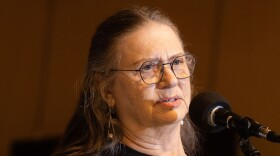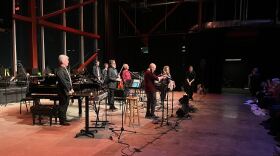For one week in 1968, late night host Johnny Carson made the historic decision to give up his job on The Tonight Show and allow actor and activist Harry Belafonte to take over.
At the time the country was facing historic protests over racial justice, continued involvement in the Vietnam War and a contentious election that eventually saw Richard Nixon win the White House.
A documentary, The Sit-In: Harry Belafonte Hosts The Tonight Show directed by Yoruba Richen, takes a look at the week that introduced many Black figures to white audiences across the nation.
“Basically, Johnny Carson, who hosted The Tonight Show recognized that there was a lot going on during this time and he needed somebody who could take over the show and talk about this stuff in a way that was entertaining and yet serious, and he chose Harry Belafonte,” explains Richen.
In Belafonte’s negotiations to take over the show, one thing he pushed hard for was the ability to choose the guests each night. He eventually won and used his power to bring on a wide range of figures.
“Everyone, artists, activists, including Paul Newman and Zero Mostel and Lena Horne and Diahann Carroll and Aretha Franklin and, you know, his friend, Dr. Martin Luther King and it was his, Dr. King’s, last televised interview,” notes Richen.
She says that in talking with Belafonte for the documentary, she came to understand that his choices for who he was having on as guests was a way to show the country how he understood and saw the times they were living through.

During this time more entertainers were becoming activists around these issues that were plaguing the nation, but Richen notes that Belafonte never separated those two parts of his life.
“Harry was an entertainer and an activist always, so one I don’t think came before the other,” she says. “Staying neutral wasn’t an option for many, especially African Americans, but for other entertainers as well.”
Something that Richen says is often forgotten is just how racially segregated TV shows were at that time. “Having multi-racial guests, you know, sitting on the couch, Johnny’s couch, or interacting was very rare,” she notes.
Despite being one of the most popular shows on television at the time, Belafonte breaking down racial barriers for a week did not lead to as much change in late night TV as some had hoped. It would be 30 years before the next Black man, Arsenio Hall, would host a late night talk show.
“Obviously it didn’t break down the doors, you know, that late night got diversified but that’s usually not what happens in Hollywood,” says Richen.
Richen hopes her film and effort to remember Belafonte’s time on The Tonight Show and his career as an entertainer and activist will help push the calls for increased diversity in the genre forward.
“There’s been demands for more diversity in late night and hopefully this film will be another voice in calling for that,” she says. “People get their news from late night, people get their understanding of the country and the world, so obviously we need to have more diverse late night hosts who we can understand their perspective and understand their take.”
Editor's note: This story was originally published February 24, 2021.








